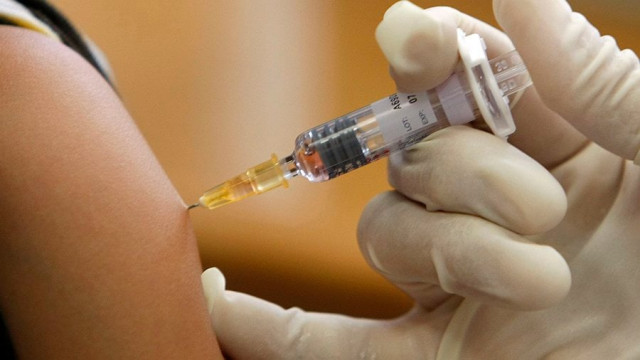Immunisation can prevent more than two million child deaths in Pakistan
PPA president says inoculation triggers anti-bodies to fight against disease thus reducing dependence on antibiotics

A doctor vaccinates a patient in a municipal vaccination centre. PHOTO: REUTERS
However, despite the free availability of vaccination by government, it is very unfortunate that Pakistan has lowest coverage rate in South Asia.
These remarks were made by the President Pakistan Paediatric Association Pakistan (PPA) Dr Rai Muhammad Asghar, at a press briefing to mark upcoming World Immunisation Week.
World Immunisation Week – is observed in the last week of April – aims to highlight the collective action needed to ensure that every person is protected from vaccine-preventable diseases. This year’s theme: ‘Protected Together, #VaccinesWork’, encourages people at every level to go further in their efforts to increase immunisation coverage for the greater good.
At the briefing Dr Rai appealed that parents should not compromise on immunisation of their children as it saves them from illness, disability and death from vaccine-preventable diseases.
He said that life-threatening infectious diseases can be treated and controlled through immunisation which also reduces the disease burden. Vaccines also play a major role in eliminating and preventing diseases including diphtheria, hepatitis B, measles, mumps, pertussis (whooping cough), pneumonia, polio, rotavirus diarrhoea, rubella and tetanus.
Every year due to vaccines, approximately three million deaths are prevented. An estimated 19.5 million infants worldwide are still missing out on basic vaccines.
Measles sweeps Sindh as 26 children hospitalised in Dadu
If the optimum rates of immunisation or “herd immunity” are not maintained, the diseases prevented by vaccination will return, he added.
Dr Rai while talking about facts of the deadliest preventable diseases in Pakistan said “In Pakistan, rotavirus leads to one out of three infant hospitalisations and almost every child gets infected with rotavirus by their fifth birthday.”
Moreover, pneumococcal meningitis is the most common form of meningitis and the most serious form of bacterial meningitis. Very young children – as young as a few months old and up to the age of two are at the highest risk of pneumococcal meningitis, said Dr Rai.
Similarly, polio is a highly infectious viral disease that can cause irreversible paralysis. Measles is a highly contagious disease caused by a virus, which usually results in a high fever and rash, and can lead to blindness, encephalitis or death. Hepatitis B is a viral infection that attacks the liver, he added.
He also stressed on the need for vaccination said that “Vaccination can reduce the usage of some antibiotics. So, they can tackle the problem of antibiotic resistance. Vaccines activate antibodies that fight off the disease at hand, without actually giving you the disease. They trick us into fighting a disease we don’t have, so that our body is prepared to fight it off if we are exposed it in the future.”
He added that every year, vaccines prevent six million deaths worldwide. Vaccines are the most affordable solution when it comes to preventing certain health hazards. They can prevent even death that is caused by diseases like polio, measles, whooping cough, diarrhoea and pneumonia. Moreover, if people are not vaccinated, diseases that have become uncommon such as pertussis (whooping cough), polio and measles, will quickly re-appear.
It is pertinent to note that in Pakistan Expanded Program on Immunisation (EPI) was established in 1978, EPI currently aims to vaccinate approximately six million children aged 0-11 months against ten target diseases: Childhood Tuberculosis, Polio, Diphtheria, Pertussis, Diarrhoea, Hepatitis B, aemophilus Influenza Type b (HIB), pneumonia, measles and tetanus.
Published in The Express Tribune, April 22nd, 2018.



















COMMENTS
Comments are moderated and generally will be posted if they are on-topic and not abusive.
For more information, please see our Comments FAQ